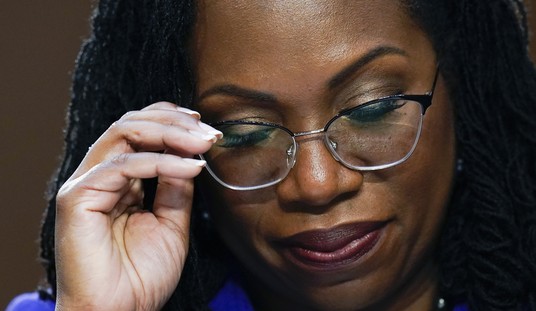Virginia Sen. Jim Webb said that an obsession with the Middle East has distracted Washington from the dangers in the Western Pacific. He told David Gregory on “Meet the Press” Sunday that while it was mesmerized elsewhere the U.S. had let China expand unchecked. “Our situation in East Asia with respect to China and China’s expansionist military activities has deteriorated. We are at a point in the South China Sea right now where we are approaching a Munich moment with China, and it’s not being discussed.”
Not even Gregory wanted to discuss it, according to Nicholas Benton at Maritime Security Asia. “Last weekend on NBC’s “Meet the Press,” anchor David Gregory repeatedly ignored the comments by Virginia’s U.S. Senator Jim Webb about an “Munich moment” in the South China Sea that is extremely important to U.S. strategic interests.”
Gregory was ill-equipped, clearly, to handle any breaking news on his show that had not been vetted by his superiors ahead of time. He twice passed over Sen. Webb’s reference to a troubling act of military aggression by the Chinese to stick to the script on the subjects of Afghanistan and Libya.
But the next day, this Monday, a resolution introduced into the U.S. Senate by Webb was unanimously approved. It put the U.S. Senate on record “deploring the use of force by China in the South China Sea,” and called for “a peaceful, multinational resolution to maritime territorial disputes in Southeast Asia.”
The incident in question occurred on June 9. Three Chinese maritime security vessels ran into and disabled the cables of a Vietnamese exploration ship, the Viking 2, in an area within 200 miles of Vietnam’s continental shelf. The area is recognized under international law to be within Vietnam’s Exclusive Economic Zone.
This case followed similar incidents on May 26 near Vietnam, and in March near the Philippines, as well as incidents at sea last September in waters of the Senkaku Islands, under the legal administration of Japan, according to a statement issued Monday by Sen. Webb’s office.
China was outside the narrative and therefore invisible to the general press. The trade papers had something to say though. The Diplomat asked whether Webb was really justified in likening China’s expansionism in the South China sea to Munich. True the principles involved were the same, but what was not yet known was whether the consequences would be comparable. Maybe someday if things got very bad then historians would look back in retrospect and say “aha, this is where it all went bad”.
Historical analogies are always imperfect. That holds true here. It remains to be seen whether the South China Sea, a maritime thoroughfare where Secretary of State Hillary Clinton and other dignitaries have repeatedly declared a US national interest, ranks as a lesser objective for Washington. Just one indicator that’s not the case: the 2007 US Maritime Strategy, the guiding document for US Navy, Marine Corps, and Coast Guard efforts, declares in effect that the United States will remain the leading sea power in the Western Pacific and the Indian Ocean for the foreseeable future. If Washington is serious about this, it can hardly relegate Southeast Asia—the seam between the two oceans—to afterthought status. In Chamberlain’s terminology, the South China Sea may be a faraway expanse, while Americans may take little interest in regional affairs. They can hardly look on indifferently.
Would concessions egg China on, encouraging it to aggrandize itself further at its neighbors’ expense? This is a central question for China watchers. Settling matters along its maritime periphery—the South China Sea, Taiwan, the Senkaku/Diaoyai Islands dispute, and the like—on its terms could satisfy Beijing. And indeed, these controversies all fall within China’s historic periphery, where China believes it must get its way. But it’s also possible that these would be appetizers, as the Rhineland, Austria, and Czechoslovakia were for Nazi Germany. Whether China would be a sated power or would search out for additional tasty treats remains unclear.
But in the meantime, the stories are all about the Republican obstructionism to raising the debt limit. Yet curioiusly, one of the reasons the administration may be reluctant to resist China more vigorously is because they are looking to borrow more money from Beijing to make “investments” and stimulate the economy for 2012. A key reason why the administration wants assurances from Congress that it will not hinder the further servicing and expansion of debt is to calm China, which holds so much of it.
Unless the limit is raised by August 2, the Treasury says, growing commitments will force a default.
Ratings agencies Moody’s and Standard & Poor’s have warned they may downgrade Washington’s sterling Triple-A debt rating, and leading US creditor China, Wall Street titan JPMorgan Chase and the Federal Reserve have also sounded the alarm.
After five straight days of crisis talks ended Thursday without a clear solution, Obama implored lawmakers to embrace “shared sacrifice” to help break the stalemate.
Washington may or may not care much about Chinese naval actions, but it does worry about whether Beijing would regard Washington with less than complete confidence when it came to buying more of its bonds.
“We hope the U.S. government adopts responsible policies to protect the interests of investors,” said Chinese Foreign Ministry spokesman Hong Lei at a regular briefing, carrying on the consistent line from Beijing, which held at least $1.152 trillion in Treasury securities as of April, making it the U.S. government’s largest creditor. A spokeswoman for China Investment Corp. said the sovereign wealth fund wouldn’t comment, so as not to cause “unnecessary moves in the market.”
The big government agenda was linked to Cathay by a golden cord. The Right to aJob, to government health care, to an Ipad and other goodies really depended on more money. And the prospect of borrowing more money required China. “Freedom from Want” in the a deficit economy meant No Freedom from China. Perhaps the most impressive thing about James Webb’s warning was that it came from a Democrat. By warning against Chinese moves in the Pacific, Webb indirectly raised an issue which would harm the chances of his own party in 2012. Why did he do it? Perhaps out of some notion of a higher duty to country.
It has now become quaint, even Quixotic, to put the interests of one’s country over personal and party concerns. “Love,” John Le Carre once wrote, “is whatever you can still betray.” And what can moderns still betray? It is now far easier to turn one’s back on an unloved birthplace, the affection for which is now regarded as a kind of bigotry. Today’s political class is far more comfortable owing allegiance to itself. What affection it has left over has never been weighed the crucible of choice. And maybe all that amounts to is a hill of beans. Perhaps that is why concerns about “Munich” have so little resonance today.
Murray Sale asked Kim Philby how he could deny being a traitor in the face of the obvious facts and was told that “to betray, you must first belong. I never belonged.” Never that is, except to the KGB, which Philby fell all over himself to join. “One does not look twice at an offer of enrollment in an elite force.” Cruelty is perhaps the first cousin to self-love. It may even be its child, requiring, as George Eliot put it, “no motive outside itself … only … opportunity.”
“No Way In” print and Kindle edition at Amazon
Tip Jar or Subscribe for $5











Join the conversation as a VIP Member